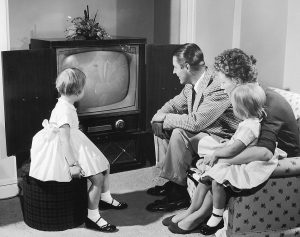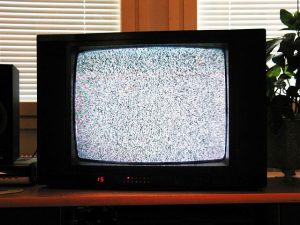The suggestion in the BBC Plan that BBC4 is to stop making new programmes and become a largely repeats-only channel, possibly only accessible online, is a depressing reminder to viewers of a very long-term trend.
Oh dear. Whatever happened to television? And in particular, the area that BBC4 was particularly supposed to promote – factual and arts television. The channel that was launched with the slogan, “Everybody Needs a Place to Think”. Has the BBC decided that they no longer do?
Or rather, that it is not for them to provide it, when they can concentrate on ‘youth programming’ like BBC3, with the assumption patronising to both young and old that serious factual programming is only for the elderly.
Time was when working in television was to work in one of the most exciting industries around. I certainly found it so. A huge wealth of documentary-making talent showed us how we were living both in this country and abroad – to reveal ‘The World About Us’, as one of its most popular and long-running series proclaimed. Arts documentaries would introduce cutting-edge new artists, and often be so well-made as to be artistic films in their own right: the glory days of Arena, 40 Minutes.
Now it’s largely curatorial. A glance at the schedules shows a woeful lack of ambition, with a staggering amount of repeats. There are hardly any new observational documentaries to show us how other people live. The best we’re likely to get is Come Dine With Me. And, with rare exceptions, the only arts documentaries are obvious coffee-table accompaniments to big shows at the National Gallery, stately and reverential.
For some years now, BBC 4 has settled into a comfortable armchair with carefully stage-managed history lessons by presenters like Andrew Marr, or Lucy Worsley – ‘floating lectern’ programmes as they are known in the business – where the presenter delivers us a lecture with an appropriate and changing backdrop, a bit like a PowerPoint presentation. All fine in their way of course, but very, very safe.
The BBC needs to reset its priorities and its ambition. It’s not enough to do the occasional marquee drama, good as Wolf Hall, War and Peace and others have been. We can get plenty of those on other platforms and nothing the BBC has done recently is as good as the extraordinary Succession, favourite to win all the major awards this year.
What the BBC can do – and perhaps should do to fulfil its public remit – is far more documentary, which it has allowed to wither on the vine.
There is an appetite for knowing how others live. An appetite that has grown as we live in an increasingly compartmentalised world – and in recent weeks when we’ve all been shut in. And an appetite that the BBC is signally failing to feed.
 I grew up in a television generation which valued the idea of ‘broadcasting’ in the full sense of the word – reaching a large number of people with material they might not have seen before.
I grew up in a television generation which valued the idea of ‘broadcasting’ in the full sense of the word – reaching a large number of people with material they might not have seen before.
Imagine that television was invented today. That we suddenly created the capacity for large numbers of people to have a communal experience by watching the same programme at the same time all around the country. And not just the Queen addressing the nation – although her success at doing that just the other day was a reminder of how powerful television can be.
Some of the most extraordinary programmes made last year were documentaries: the award-winning For Sama chronicling the Syrian war from the point of view of one family living in Aleppo; Kingmaker’s startling revelations about Imelda Marcos in the Philippines; Netflix’s The Edge Of Democracy about Brazil. My son and I watched Netflix’s eye-opening 13th about black rights in the States last night in the wake of the George Floyd protests. None were made by the BBC.
The BBC needs to regain its ambition when it comes to factual television. That this can be hugely successful has been shown by both Netflix and HBO. It also has the signal advantage of having become far, far cheaper. Technology allows for documentaries to be shot by just a handful of people these days. For a BBC facing budget cuts, it makes financial sense as well to make more documentaries and fewer dramas. There is a wealth of young filmmaking talent out there itching to make documentaries about the world about them and given very little chance by the BBC: you can see some of the wealth of talent at the Sheffield Documentary Festival which opens online this week, and which I helped instigate back in the 1990s at a time when the BBC still ran a lot of documentaries themselves and I was working there.
Nor is it just about the size of the audience. Just as with Radio Four, for the BBC to command a licence fee or a central position in the broadcasting ecosystem, it also needs to command respect. And that means doing things that straightforward commercial channels might baulk at.
Now that Tony Hall is retiring, Tim Davie as incoming Director General needs to reset the BBC’s vision and purpose. Tony Hall has done much to steady the horses after years of damaging management reorganisations and scandals over excessive executive and presenter pay. His replacement will have the opportunity to get on the front foot once again, which the BBC badly needs to do if it is to survive. Otherwise it will reach the point where every one of its channels is just showing repeats.
——
Hugh Thomson was BAFTA-nominated for his BBC series on the history of rock and roll, Dancing in The Street and won the Grierson Award for his series on India with William Dalrymple. He was an instigator and founder member of the Sheffield Documentary Festival.

